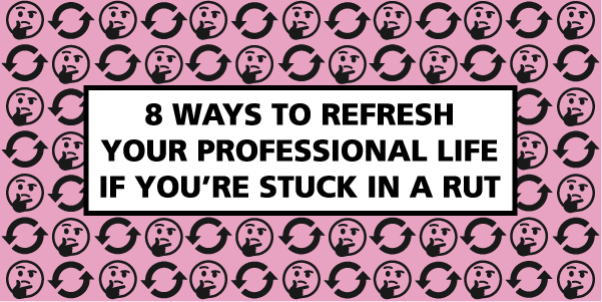8 ways to refresh your professional life if you’re stuck in a rut

This piece was written by freelancer Lucy Skoulding
Feeling bored in your job? It doesn’t necessarily mean you have to quit and run off into the sunset.
But it’s devastating when a job you once loved, now makes you feel demotivated, uninterested and flat. But don’t let it panic you. There are plenty of options if you are feeling a lack of inspiration every day when you go to work.
Here are 8 ways to refresh your professional life when you’re stuck in a rut.
Learn a new skill
Feelings of dissatisfaction towards your job may come from the need for you to learn new skills or knowledge, which will then allow you to focus your role on a slightly different area or be able to offer your hand in new tasks.
Alison Goodwin, founder of Your Future Self and past recruiter believes learning a new skill is always valuable. “Think about how you can increase skills through workshops, coaching and training that will enable you to progress. What can you invest in? Work with your current employer and see if they are willing to invest in your training or coaching” she said.
Redefine your role
If you have come to a seeming dead end in your current job, ask yourself whether you need to changes careers completely, or whether it is a case of renegotiating your current role with your company?
It is always worth being honest with your employer as they would rather try to adhere to your ambitions than lose you. Ensure you go with an alternative suggestion though, or at least the area you would like to move into.
Lucia Knight, mid-life career re-designer and author, said: “Figure out your superpowers, then consciously re-design the work that you do to incorporate them more often into your daily, weekly and monthly work.”
Essentially, work out what really energises you and what you are honestly good at. If these don’t match your current role, can you find a new role that does?
Start a side hustle
Sometimes a feeling of lacking at work might actually be caused by dissatisfaction outside of the workplace. As yourself, if you took your life outside of work in isolation, would it make you happy? If this is because you struggle to make time for things you enjoy, how can you change this?
Starting a side hustle has so many benefits. For one, it will earn you some extra money, which none of us are complaining about. Perhaps more importantly side hustles can hugely strengthen how satisfied your feel professionally. Their beauty lies in their differences. Side hustles allow you to focus on something very different from your day job and they are your chance to pursue something you really care about.
Sometimes, they are even more than this. Nicholas Mason, founder of online electronics store Tekkio, started his business while working full-time then quit his job to focus on the new venture as it grew.
He said: “For me, Tekkio was an extra money-earner and something I actually enjoyed doing. I feel pretty lucky that I now do it full time but I didn’t necessarily expect it would turn into this at the start.”
Ask for a promotion
Asking for a promotion is never the easiest thing to do – though I have to admit it gets easier the more you do it. It’s an important fear to face and may well be the change you need to motivate yourself professionally again.
Hannah Martin, founder of Talented Ladies Club, said “When it comes to securing a promotion or pay rise, the age-old saying ‘If you don’t ask, you don’t get’ perfectly applies. There’s no shame in putting yourself forward for an opportunity.
“If you don’t you could risk watching a less deserving colleague grab it – and race up the career ladder ahead of you. So don’t let a fear of rejection hold you back from asking. If you are told ‘no’ it’s an ideal opportunity to politely ask what you would need to do to turn it into a yes.
“This gives you a strategy to follow in order to land the promotion next time. If your employer indicates that they don’t feel that you’ll ever be right for it, it’s better to know now so you can search for a job where your skills are valued, and you have a genuine shot at building your career.”
Get a mentor or coach
Don’t make the mistake of thinking a mentor is only for those early in their careers. You can make use of a mentor at any time and feeling like you’re stuck in a rut might just be the perfect reason to search for one.
Mentors can either be formal or informal. Businesses sometimes have official mentoring programs or you might be able to apply to one run by an external organisation specialising in your industry. Alternatively, why not just speak to someone you already know in your sector and ask for their advice?
Career Change Coach, Dina Michele, explained: “A strategy alone is sometimes not enough to change your working life – you may need some support throughout the process on how to cope with change and how to move forward.
“The good news is that having support from someone who can help you shift your perceptions about what’s possible for you in a positive way can quieten these fears enough to motivate you to take mindful action in the direction you want. This is where a coach supports and facilitates.”
Take a career break
Feeling stuck in an endless loop at work is closely aligned with feeling burned out. Stop and think for a moment – when did you last properly relax? When was your last break? How long have you been working in this role?
Everyone needs a break sometimes, we are all only human, and admitting that could be your first step to feeling more positive about your career.
Karin Peeters, who started Inner Pilgrim and has been a coach and psychotherapist in the City of London for more than ten years, said she’s seen an increasing number of people use travel as a way to refresh themselves and their career.
She said: “They ask for extended leave, take a break between two jobs or use their holiday to reflect. They make space to check if they are still happy with the direction their career is taking. To take the decisions ahead consciously, and not on auto-pilot.”
And Leslie Parsons, a career management consultant at My Career Bubble, said that long-term feelings of dissatisfaction towards a job are often caused by a fundamental conflict between organisational goals and expectations and personal and professional values.
She commented: “Career dissatisfaction has become a critical recruitment and retention problem in professional roles such as medicine, and teaching which have historically been vocational roles. At the same time, organisations are demanding that professionals and experts to lean in and see the big picture and replace a professional perspective with a managerial/economic priority to their work.
Network
Maybe all you need to do is make small changes to feel better about your professional life. Sometimes our daily routines can become too mundane and all we need is some inspiration to feel excited about what we’re doing again.
Emily Bain, co-founder of boutique recruiter Bain and Gray, advised: “Always look for the silver lining to every cloud in your career. Interacting with your existing contacts will help promote yourself – get noticed with profile updates on social media and job boards.
“Register with recommended and referred recruitment agencies that are the right ones for you and will actively market you in the market place.
Retrain
Feeling bored or tired of your job might mean it’s time for a change – and that’s perfectly ok.
Responding to our Twitter call, Chris Whitehead said: “I’ve refreshed my professional life several times during my career as a designer, academic, contractor, business development director, MD and now executive coach. Do what you love, embrace learning and relationships, avoid over-reliance on a high income.”
Alison Goodwin continued: “Change is good and society is evolving, you no longer have to stay in a career because it’s comfortable and safe.
“Historically employees would stay in a career they felt no passion for because they feared change, the money was good or even simply down to loyalty. That tide is changing, and people are now stepping into their best version of themselves. “
